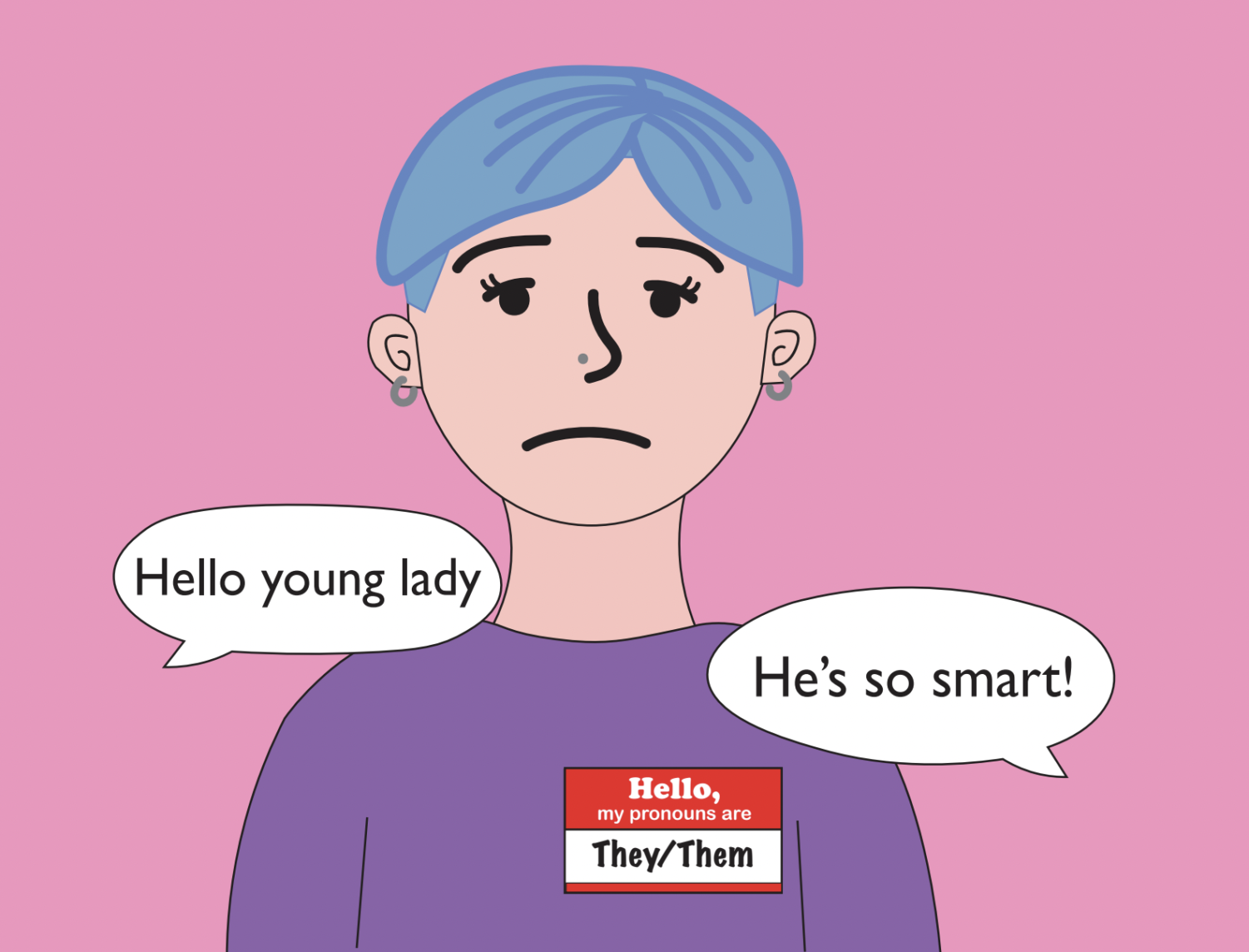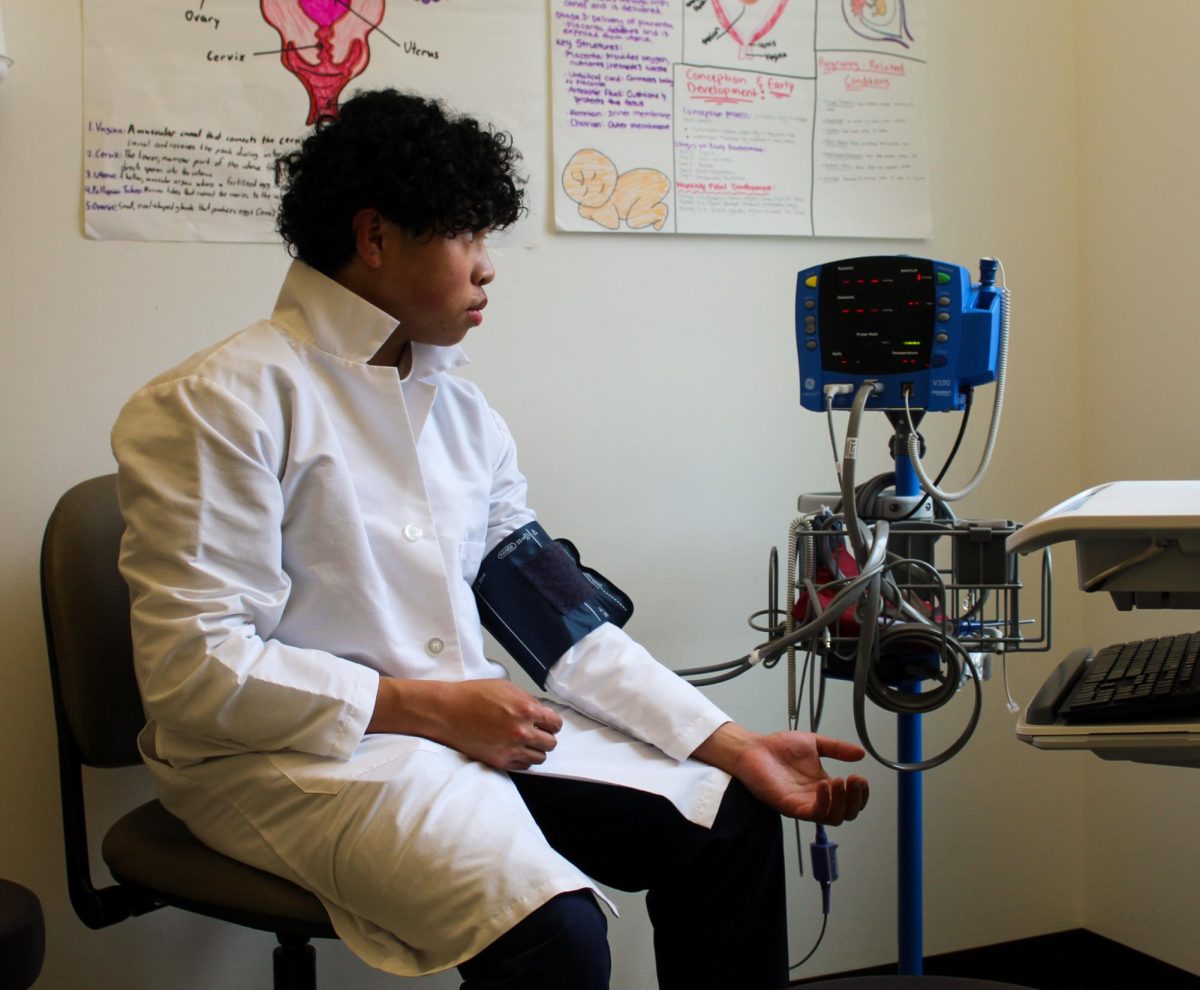Misgendering is the accidental or deliberate disregard of a transgender person’s identity. Transgender people are those who don’t identify with the gender they were assigned at birth. Non-transgender people are identified as cisgender.
Misgendering occurs in many forms, such as using incorrect pronouns, deadnames or exclusionary gendered terms. A deadname is a name a transgender person no longer goes by and is usually the one they were assigned at birth. Gendered terms are words that refer to people specifically by gender, such as “ma’am,” “sir,” “girl,” “boy” and others. Transgender people who don’t “pass,” or look like they are cisgender, are more likely to experience misgendering. According to a 2022 study conducted by the National Library of Medicine, misgendering in school is an alienating experience that can have negative impacts on mental health.
For sophomore Hazel Colver (xe/they/he), being misgendered in school is embarrassing when teachers do it in front of the class, because xe must then correct the teacher and explain xyr gender identity in front of everyone. Colver said that this is hurtful because xe knows that some of xyr peers are transphobic.
“Last year, I was in this class, and my teacher just was not really grasping my pronouns that easily,” said Colver. “He just continually misgendered me for the entire semester until eventually, I had to talk to the counselor and had them and the assistant principal tell him to stop, because otherwise he just would not get it.”
Misgendering can also happen with substitute teachers, since they don’t personally know students and transgender students may have deadnames in the school system. Freshman Milo Zacarias* (he/him) said he is often misgendered by substitute teachers.
“I have, in the past, corrected substitute teachers, and I’ve had an experience where one time I was like, ‘Hey, like my pronouns are actually he/him’, and he was like, ‘Sorry, you just don’t pass very well. You just don’t look like a guy, which is why I didn’t think you were a guy’, and I was like, ‘Wow, that really hurts my feelings’,” said Zacarias.
Although instances of misgendering are sometimes accidental, they reflect ignorance towards transgender identities. Senior Bren Bartol (they/he) said that misgendering feels the most painful for them when their close friends or family do it.
Intentional misgendering often has a stronger impact than instances of accidental misgendering. Some people view pronoun and name changes as inconvienient, and, in some cases, misgender people intentionally as a form of bullying. Sophomore Zane Rubenstein (he/they) has experienced deliberate misgendering that was meant to insult him and his identity.
“Pronouns hurt because those aren’t the pronouns that I use, and I associate those pronouns with somebody that I’m not and somebody that I had to fight to not be,” said Rubenstein. “With [deadnaming], I’ve had it deliberately used against me as an insult by multiple people. It’s my deadname; I don’t like hearing it. There’s this negative connotation associated with it, which just makes it so much worse to hear.”
Misgendering can also contribute to gender dysphoria, a sense of unease that a person may have because of a difference between their biological sex and their gender identity. For some, dysphoria can have negative impacts on mental health, either by creating or contributing to issues such as depression and anxiety.
Sophomore Atlas Stocker (he/him) explained that when he’s feeling dysphoric, misgendering contributes to his feelings of insecurity in his identity. Stocker said that this can worsen his mental health, especially when he’s already in a bad place.
Gendered bathrooms are another common form of misgendering. Some transgender students feel they must choose between honoring their gender identity and avoiding unsafe situations. By using a bathroom that matches their gender assigned at birth, transgender people, espeically non-passing transgenders, protect themselves from possible assault, but misgender themselves in the process. According to a 2019 article published by the American Medical Association, gendered restrooms can contribute to gender dysphoria and compromise the safety of transgender students. Although he identifies as male, Zacarias said that he uses the female and gender neutral bathrooms at school because he doesn’t deem the male bathrooms safe, since he is often perceived as feminine.
“I just kind of try to avoid using the bathrooms in general, or I’ll tend to only use the bathroom when I’m in choir because it’s gender neutral,” said Zacarias.
Inglemoor’s campus was built in the 1960s and doesn’t have many gender neutral restrooms. Administrative intern Julia Francis (she/they) said they’re planning to add in more when the school is remodeled. However, this doesn’t help current students since the remodel will not be finished for at least three years. Bartol said that many of their transgender friends go all the way to the art and band buildings to use a gender neutral bathroom.
“It doesn’t matter if you are the best passing trans person ever. You’re not going to feel 100% safe in any public bathroom.”
According to the Washington Office of Superintendent of Public Instruction, it is a responsibility of Washington public schools to provide a safe environment for transgender students. Addressing someone correctly among peers is an important way to make transgender students feel safe at school. Respecting students’ pronouns and gender identity can positively impact transgender peoples’ mental health, as gender is an important aspect of many transgender peoples’ identity. Sophomore Cameron Arthur (she/her) finds support and community within the school’s Gender and Sexuality Alliance and other school resources such as counselors.
“GSA is obviously the main support system for queer students here at Inglemoor. So if someone is misgendered, at GSA, you have all your friends there, and you’d be able to tell them, ‘Oh, this is what happened,’ as a way for you to vent about it,” said Arthur.
Representation in administration allows for more LGBTQ+ perspectives to be considered and recognized. Francis said that one of their goals is to create a more inclusive environment and campus for transgender students. They said the upcoming remodel of the campus has been a good opportunity to speak up for those students and address their concerns.
“I am always a voice in the back of everybody-who-will-listen’s ear about making sure that we are being inclusive and making sure that we’re thinking about our trans and nonbinary students when we are designing the buildings,” said Francis.
Many transgender students must be their own advocates when it comes to standing up to misgendering because their cisgender peers may not understand the situation or know how to help. There are resources online for cisgender people to learn how to handle and avoid misgendering in a respectful manner. Colver said that when they begin a new class, they email website guides, such as practicewithpronouns.com, to their teachers on how to use their neopronouns correctly. Another resource to learn about LGBTQ+ terms is the Gay & Lesbian Alliance Against Defamation.
“A big thing with my neopronouns is that people genuinely don’t understand how to use them grammatically, and so I just have to explain it to them,” said Colver. “And then if they don’t get it, I’ll send them websites, and then they can practice on their own, and it isn’t my obligation to teach them how to use my pronouns.”
Arthur said that misgendering is often based on assumptions drawn from people’s appearance and whether they present masculine or feminine. Arthur added that transgender students would benefit from their cisgender peers clearing away some of their assumptions about gender presentation and asking people what their pronouns are instead of assuming if they are unsure.
“It is so empowering to just be strong and who you are. And everyone else who doesn’t believe in you, just leave them in the dust because that’s the only way that we’re gonna get through,” said Bartol.
*Name changed for anonymity












